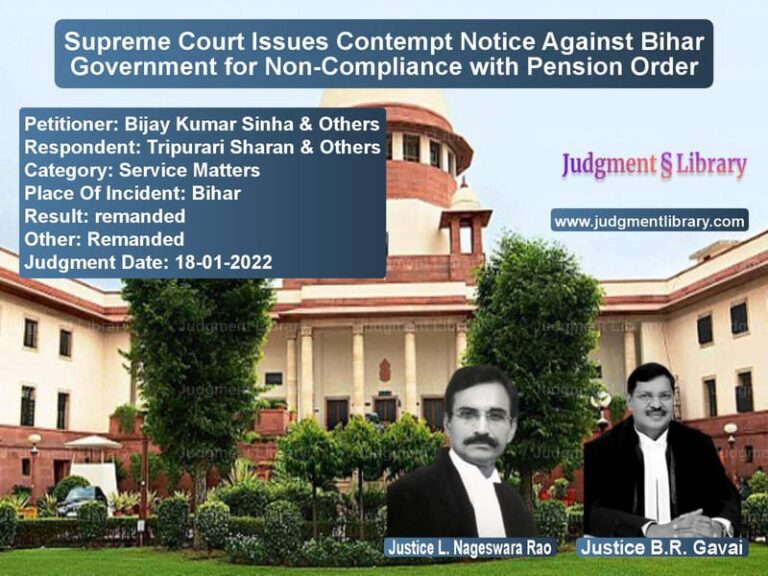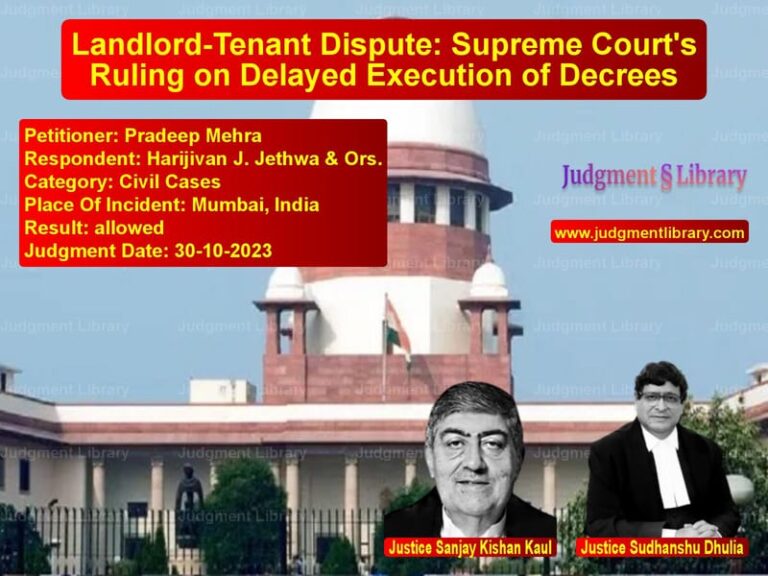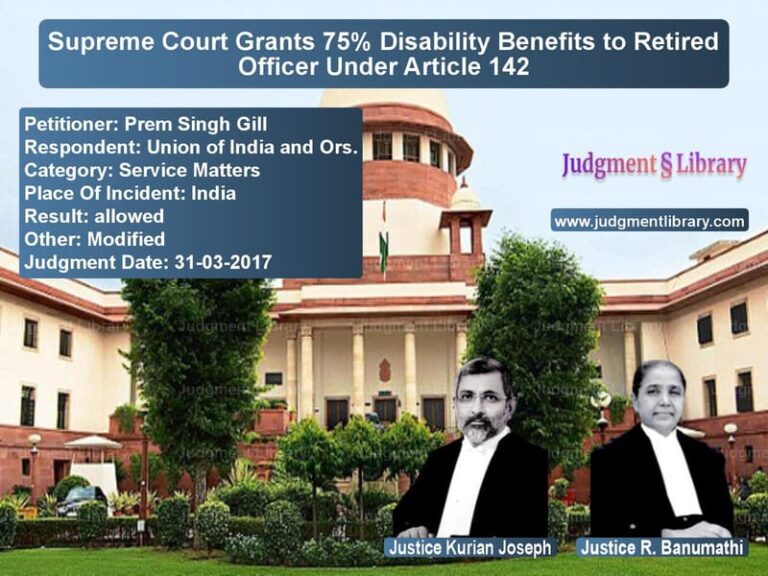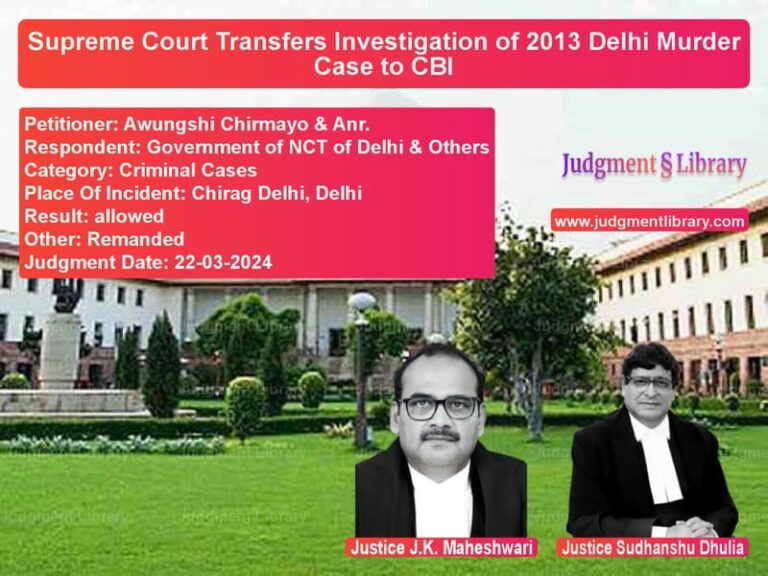Supreme Court Upholds Rejection of Late Claim in Insolvency Proceedings
The Supreme Court of India recently delivered a significant judgment in M/s. RPS Infrastructure Ltd. v. Mukul Kumar & Anr., addressing the issue of late claims in insolvency proceedings under the Insolvency and Bankruptcy Code (IBC), 2016. The Court upheld the National Company Law Appellate Tribunal (NCLAT) decision, rejecting a belated claim from the appellant, emphasizing the importance of strict timelines in insolvency resolution.
Background of the Case
The case revolved around a contractual dispute between the appellant, M/s. RPS Infrastructure Ltd., and the corporate debtor, KST Infrastructure Pvt. Ltd. The dispute arose from an agreement dated August 2, 2006, under which the corporate debtor was to develop an 8-acre residential project in Faridabad, Haryana.
Following disagreements, arbitration proceedings were initiated, culminating in an arbitral award on August 1, 2016, in favor of the appellant. The award required the corporate debtor to transfer the necessary licenses and pay monetary damages. However, before the award could be fully enforced, insolvency proceedings were initiated against the corporate debtor under Section 7 of the IBC on March 27, 2019. This led to the appointment of an Interim Resolution Professional (IRP) and the formation of a Committee of Creditors (CoC).
Chronology of Key Events
- August 1, 2016: Arbitration award passed in favor of the appellant.
- March 27, 2019: Corporate insolvency resolution process (CIRP) initiated against the corporate debtor.
- March 30, 2019: Public announcement inviting claims from creditors.
- April 25, 2019: Section 34 petition dismissed, upholding the arbitral award.
- July 26, 2019: Appellant executed a Special Power of Attorney in favor of the corporate debtor.
- August 19, 2020: Appellant submitted a claim of Rs. 35.67 crore.
- August 25, 2020: Resolution Professional (RP) rejected the claim for being time-barred.
- July 30, 2021: NCLAT ruled against the appellant.
Legal Issues Before the Supreme Court
The Supreme Court examined the following key issues:
- Whether the appellant’s late claim should have been entertained by the Resolution Professional.
- Whether the failure to include the appellant’s claim in the information memorandum constituted a violation of due process.
- Whether insolvency timelines are mandatory or merely directory.
Arguments by the Appellant
The appellant contended:
- That its claim should be recognized as a contingent liability, given the ongoing appeal under Section 37 of the Arbitration and Conciliation Act.
- That the Resolution Professional failed to conduct due diligence in verifying the corporate debtor’s records.
- That it was unaware of the public announcement inviting claims and should not be penalized for the delay.
- That the adjudicating authority had ruled in its favor, but the NCLAT incorrectly reversed this decision.
Arguments by the Respondents
The Resolution Professional and the successful resolution applicant countered:
- That the CIRP process was conducted in strict compliance with IBC provisions, and public notices were issued as required.
- That allowing late claims would disrupt the entire insolvency resolution process and set a dangerous precedent.
- That the corporate debtor’s records were not available, and due efforts were made to gather necessary financial information.
- That the resolution plan had already been approved, and introducing new claims would undermine the finality of the process.
Supreme Court’s Analysis
1. Importance of Timely Claims in Insolvency Resolution
The Court reiterated the necessity of adhering to strict timelines under the IBC, emphasizing that delays could disrupt the entire resolution framework. Citing Essar Steel India Ltd. v. Satish Kumar Gupta, the Court held:
“A successful resolution applicant cannot suddenly be faced with ‘undecided’ claims after the resolution plan has been accepted.”
2. Resolution Professional’s Duty in Assessing Claims
The Court acknowledged the RP’s efforts in obtaining financial records and ruled that the burden was on the appellant to file its claim in a timely manner. The Court observed:
“The Resolution Professional is not expected to search for every possible liability but must rely on the claims submitted within the prescribed time.”
3. Contingent Liabilities and Late Claims
The Court rejected the appellant’s reliance on Rainbow Papers Ltd., noting that the case was inapplicable as it dealt with statutory dues rather than arbitration awards. It further stated:
“The IBC is a time-bound process, and allowing delayed claims would create uncertainty, defeating the objective of insolvency resolution.”
4. Finality of the Resolution Plan
The Court stressed that once the CoC approves a resolution plan, it cannot be reopened for new claims. Citing Paschimanchal Vidyut Vitran Nigam Ltd. v. Raman Ispat Pvt. Ltd., it held:
“The resolution plan must ensure finality; reopening claims would create a hydra-headed monster of litigation.”
Supreme Court’s Judgment
The Supreme Court dismissed the appeal, affirming the NCLAT’s decision. It concluded:
“The CIRP process cannot be reopened at the behest of the appellant. The delay in filing the claim was unjustified, and the resolution plan must be allowed to proceed without disruption.”
Implications of the Judgment
This ruling has significant implications for insolvency proceedings:
- Strict Adherence to Timelines: The decision reinforces that CIRP timelines are mandatory.
- Finality of Resolution Plans: It prevents reopened claims from derailing insolvency resolutions.
- Burden on Creditors: Creditors must actively monitor corporate debtors for insolvency proceedings.
Conclusion
The Supreme Court’s ruling in M/s. RPS Infrastructure Ltd. v. Mukul Kumar & Anr. sets a critical precedent for insolvency resolution in India. By upholding strict compliance with procedural timelines, the Court has strengthened the predictability and efficiency of the IBC framework. This judgment ensures that resolution plans remain binding, preventing disruptions from late claims.
Petitioner Name: M/s. RPS Infrastructure Ltd..Respondent Name: Mukul Kumar & Anr..Judgment By: Justice Sanjay Kishan Kaul, Justice Sudhanshu Dhulia.Place Of Incident: Faridabad, Haryana.Judgment Date: 11-09-2023.
Don’t miss out on the full details! Download the complete judgment in PDF format below and gain valuable insights instantly!
Download Judgment: ms.-rps-infrastruct-vs-mukul-kumar-&-anr.-supreme-court-of-india-judgment-dated-11-09-2023.pdf
Directly Download Judgment: Directly download this Judgment
See all petitions in Bankruptcy and Insolvency
See all petitions in Company Law
See all petitions in unfair trade practices
See all petitions in Judgment by Sanjay Kishan Kaul
See all petitions in Judgment by Sudhanshu Dhulia
See all petitions in dismissed
See all petitions in supreme court of India judgments September 2023
See all petitions in 2023 judgments
See all posts in Corporate and Commercial Cases Category
See all allowed petitions in Corporate and Commercial Cases Category
See all Dismissed petitions in Corporate and Commercial Cases Category
See all partially allowed petitions in Corporate and Commercial Cases Category







